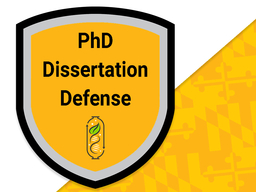PhD Dissertation Defense: Yun Jiao
Location
Online
PhD Dissertation Defense: Yun Jiao – Online Event
Date & Time
November 2, 2021, 10:00 am – 11:00 am
Description
Yun Jiao, PhD Candidate
Advisors:
Title:
DELINEATING IMMUNE-MEDIATED MECHANISMS OF DISEASES AFTER TRAUMATIC INJURY
Traumatic brain injury (TBI) is one of the most common causes of disabilities and death. TBI patients often suffer long-term neurological dysfunctions and disabilities and have higher risk of developing chronic neurodegenerative diseases. The elderly TBI patients have a higher mortality rate and suffer worse outcomes. Persistent and progressive neuroinflammation after TBI is one of the major driving forces of chronic neurodegeneration. Microglia, as the brain-resident immune cell, activates upon TBI to protect the brain from injury. However, uncontrolled and long-lasting microglial activation contributes to the neurodegeneration. With the growing understanding of inflammation in TBI-associated neurodegeneration, several drug candidates have entered clinical trial phases. However, no drugs have proven successful in clinical trials in improving neurological function outcomes. The complexity of cellular responses to injury and the short therapeutic window of drug intervention makes developing therapies particularly challenging. Therefore, elucidating of the long-lasting immune-mediated responses after TBI may provide targets for therapeutic intervention with a wider therapeutic window.
In this dissertation, I focused on identifying the immune-mediated mechanisms after TBI in a well-characterized mouse experimental TBI model, controlled cortical impaction (CCI). Hippocampal transcriptional profile was examined at four-weeks after TBI using RNA sequencing. The transcriptional signatures showed robust correlation with neurological functional impairments, suggesting that drug intervention at a few weeks after injury targeting the signatures pathways may improve functional outcomes. To investigate the role of microglia in chronic neuroinflammation and neurodegeneration associated with functional impairments, microglia were depleted and repopulated after a one week starting at four weeks after TBI using colony stimulating factor 1 reception (CSF1R) inhibition. The short-term depletion and repopulation eliminated the destructive neurotoxic microglia phenotype that contribute to neurodegeneration and improved neurological function outcomes. The findings further proved that the therapeutic window targeting chronic neuroinflammation may be prolonged to a few weeks after injury. TBI-associated inflammation is exaggerated in elderly patients. In this dissertation, a unique state of microglia was identified in the aged brain exhibiting a proinflammatory and senescent phenotype, with altered lipid signaling, endocytosis, and metabolism. CSF1R-mediated microglia depletion and repopulation eliminated the proinflammatory and senescent microglia. Furthermore, aging-related exacerbation of inflammation after injury was attenuated by elimination of the proinflammatory and senescent microglia, suggesting that age-associated neuroinflammation dysregulation after TBI may be treatable. In summary, these findings suggest that drug intervention with wider therapeutic window targeting microglia-mediated chronic neuroinflammation after TBI is possible in both young and elderly patients.
WEBEX Information:
